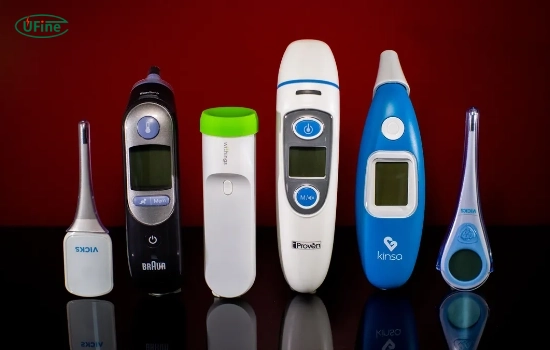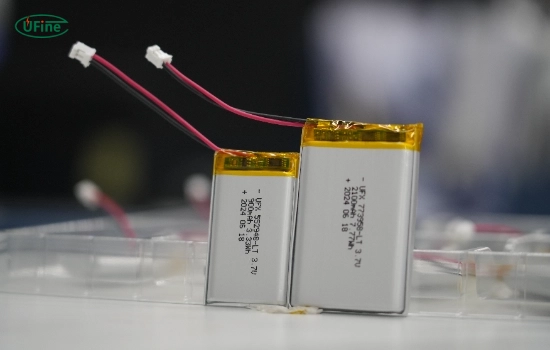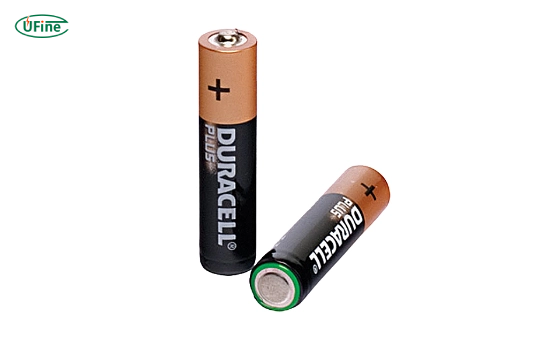What size battery does a digital thermometer use? Most models require AAA, AA, or button cell batteries (like LR41/CR2032). This guide explains how to choose the right digital thermometer battery, troubleshoot issues, and extend battery life. Key sections:
- ✅ Most Common Battery Sizes for Thermometers
- ✅ How to Check Your Model’s Requirements
- ✅ Battery Comparison Table (Voltage/Capacity)
- ✅ Pro Tips for Longer Battery Life
Part 1. Understanding digital thermometers and battery importance
Digital thermometers are electronic devices used to measure temperature. They provide quick and accurate readings, making them popular in medical and culinary contexts. Unlike traditional mercury thermometers, digital thermometers use electronic sensors to gauge temperature, allowing faster results and eliminating the risk of mercury exposure.
The battery size in a digital thermometer is crucial for several reasons:
- Performance: A suitable battery ensures the thermometer operates effectively, providing accurate readings.
- Longevity: The right battery size can extend the lifespan of your thermometer, reducing the need for frequent replacements.
- Compatibility: Not all thermometers use the same battery type, so knowing the correct size is essential for functionality.
Part 2. Common Digital Thermometer Battery Types
Digital thermometers typically use one of the following battery types:
- AAA Batteries: Many household devices, including digital thermometers, commonly use these batteries due to their availability and ease of replacement.
- AA Batteries are less standard than AAA batteries. Some giant digital thermometers may require AA batteries for extended use.
- Button Cell Batteries: Manufacturers often use these tiny batteries in compact digital thermometers, including those designed for oral or ear use.
- Lithium-ion (Li-ion) Batteries: Rechargeable batteries commonly found in more advanced digital thermometers (like those used in professional medical settings) due to their high energy density and long lifespan. They are ideal for digital thermometers that require consistent and prolonged usage.
- Lithium Polymer (LiPo) Batteries: Designers often utilize these lightweight and flexible batteries in compact devices like digital forehead thermometers and high-tech medical equipment. They prefer them for devices that need a slim profile and flexible design.
Digital Thermometer Battery Types Comparison
| Battery Type | Voltage | Typical Use | Lifespan |
|---|---|---|---|
| AAA | 1.5V | Basic models | 6-12 months |
| AA | 1.5V | Larger devices | 1-2 years |
| CR2032 | 3V | Compact thermometers | 2-3 years |
| LR41 | 1.5V | Ear/forehead models | 1 year |
Part 3. How to choose the right digital thermometer battery in 3 steps
Follow this simple process to find your thermometer’s correct battery size:
- Check the Battery Compartment
Open the compartment and look for engraved labels like “AAA” or “CR2032”. - Consult the User Manual
Search for “battery” in the PDF manual (usually available online if lost). - Use Cross-Reference Tools
If unclear, search “[Your Thermometer Model] + battery size” on Google.
Factors to Consider When Choosing the Right Battery Size
When selecting a battery for your digital thermometer, it’s essential to consider several factors that go beyond just the size and type of battery:
- Voltage Requirements: Every digital thermometer operates at a specific voltage level. Ensure your chosen battery matches the required voltage, typically indicated in the user manual or the thermometer. Using a battery with the wrong voltage can cause malfunction or inaccurate readings.
- Battery Capacity (mAh): Battery capacity refers to how much energy a battery can store, measured in milliamp-hours (mAh). Thermometers used frequently will benefit from higher-capacity batteries, which will last longer and provide more consistent power.
- Temperature Sensitivity: Digital thermometers are used in extreme conditions, such as medical environments or kitchens. In such cases, choosing a battery that can withstand a wide temperature range without losing efficiency or draining quickly is essential.
- Shelf Life: If you don’t use your thermometer frequently, consider the battery’s shelf life. Some batteries, particularly lithium-ion and lithium polymer, have a longer shelf life and are better suited for devices stored for extended periods between uses.
Part 4. Digital Thermometer Battery Installation and Maintenance Tips
To ensure your digital thermometer functions appropriately, install the battery correctly. Here are some tips:
- Positive and Negative Orientation: Ensure the battery is inserted correctly, matching the positive (+) and negative (-) symbols.
- Secure Fit: Ensure the battery fits snugly in the compartment to avoid connection issues.
- Close the Compartment: After installation, securely close the battery compartment to protect the battery and internal components.
To maximize the lifespan of your digital thermometer’s battery, consider the following tips:
- Turn Off When Not in Use: Always turn off the thermometer after use to conserve battery life.
- Store Properly: Keep the thermometer in a cool, dry place to prevent battery drainage.
- Regular Maintenance: Check the battery regularly and replace it as needed to avoid performance issues.
4 Pro Tips to Double Your Thermometer Battery Life
- 🔄 Remove batteries if unused for >3 months
- ❌ Avoid mixing old/new batteries
- 🌡️ Store in dry areas (humidity <60%)
- 🔋 Use lithium batteries for cold environments
Part 5. Troubleshooting Common Digital Thermometer Battery Issues
Even with the right battery, you may need help with issues. Here are some common problems and their solutions:
- Device Not Turning On: Verify that you have installed and charged the battery. If the problem persists, consider replacing the battery.
- Inaccurate Readings: This may indicate a weak battery. Replace it with a new one to see if the readings stabilize.
- Battery Leakage: Remove the battery immediately and clean the compartment if you notice corrosion or leakage. Then, replace it with a new battery.
Advanced Troubleshooting Tips for Digital Thermometers
If your digital thermometer continues to malfunction after replacing the battery, consider these advanced troubleshooting steps:
- Check for Firmware Updates: Some digital thermometers, particularly high-end models, come with software or firmware that may require periodic updates. An outdated firmware may cause the thermometer to misbehave, even if the battery is new. Check the manufacturer’s website for any available updates.
- Clean Battery Contacts: Over time, the battery contacts inside the thermometer can accumulate dust or corrosion, leading to poor connections. Gently clean the contacts with a soft cloth or a cotton swab dipped in rubbing alcohol to ensure a solid connection between the battery and the device.
- Inspect for Internal Damage: If the thermometer has been dropped or exposed to moisture, it may have internal damage that affects its performance. In this case, you should consult a professional or the manufacturer to determine if they can repair the thermometer or if it needs replacing.
Part 6. FAQs about digital thermometer battery
What size battery does a digital thermometer use?
Most digital thermometers use either AAA (1.5V) for standard models or button cells (CR2032/LR41) for compact designs. Check your device’s battery compartment or manual for exact specifications.
How long does a battery last in a digital thermometer?
Battery life depends on usage, but it typically lasts between 6 months and 2 years. Frequent use and backlight features may shorten battery lifespan.
Can I use rechargeable batteries in my digital thermometer?
Yes, as long as the rechargeable batteries match the required size and voltage specifications. However, some thermometers may not work efficiently with rechargeable batteries due to lower voltage output.
What should I do if my thermometer is not working after replacing the battery?
Ensure the battery is installed correctly, with the positive and negative terminals aligned properly. Also, check for corrosion or dirt in the battery compartment. If the issue persists, consult the manufacturer for troubleshooting.
How can I dispose of old batteries safely?
Follow local regulations for battery disposal. Many communities have designated recycling programs for batteries. Avoid throwing batteries in regular trash to prevent environmental harm.
Related Tags:
More Articles

Is a 3000 mAh Lithium Battery Enough for Your Device?
Wondering what a 3000mAh battery means? Learn about its power, lifespan, types, and how to choose the best one for your device!
Learn About Lithium Battery Kits
Discover the ultimate guide to lithium battery kits—types, safety, installation, and cost analysis. Make the right choice for solar, RV, or off-grid power!
Selecting the Perfect Ah for Your 48V Li-ion Battery Pack
Struggling to choose the right Ah for your 48V Li-ion battery pack? This in-depth guide covers everything you need to make the best choice. Find out more now!
LiFePO4 Pouch Cells Explained: Advantages, Applications & Comparison
Learn all about LiFePO4 pouch cells, their structure, lifespan, advantages, and how they outperform other lithium battery types. Make the right choice!
12Ah Lithium Battery Guide: Uses, Lifespan & Tips
12Ah lithium batteries last longer, charge faster & weigh less than lead-acid. See best uses, charging tips & how to extend lifespan!







